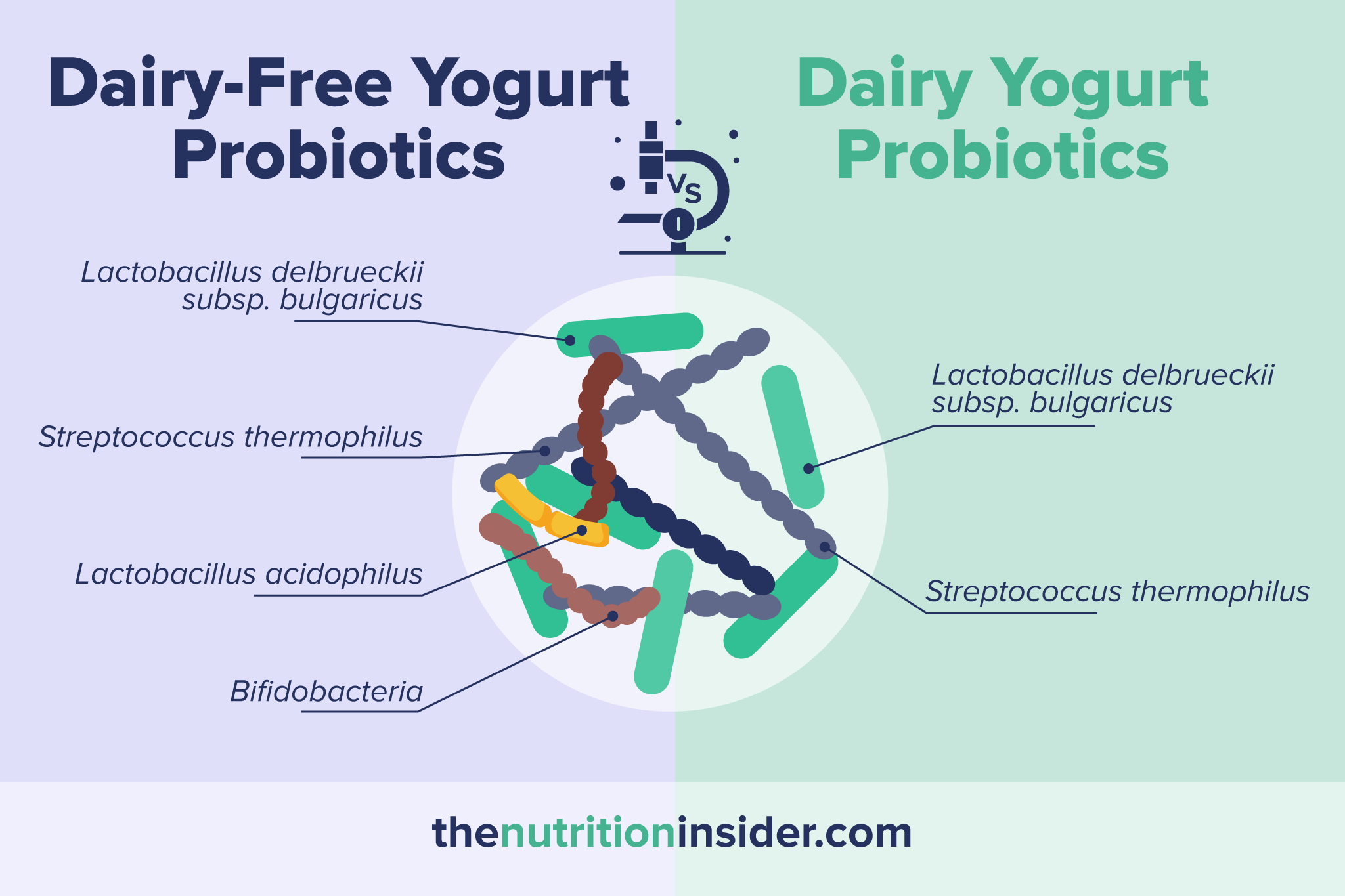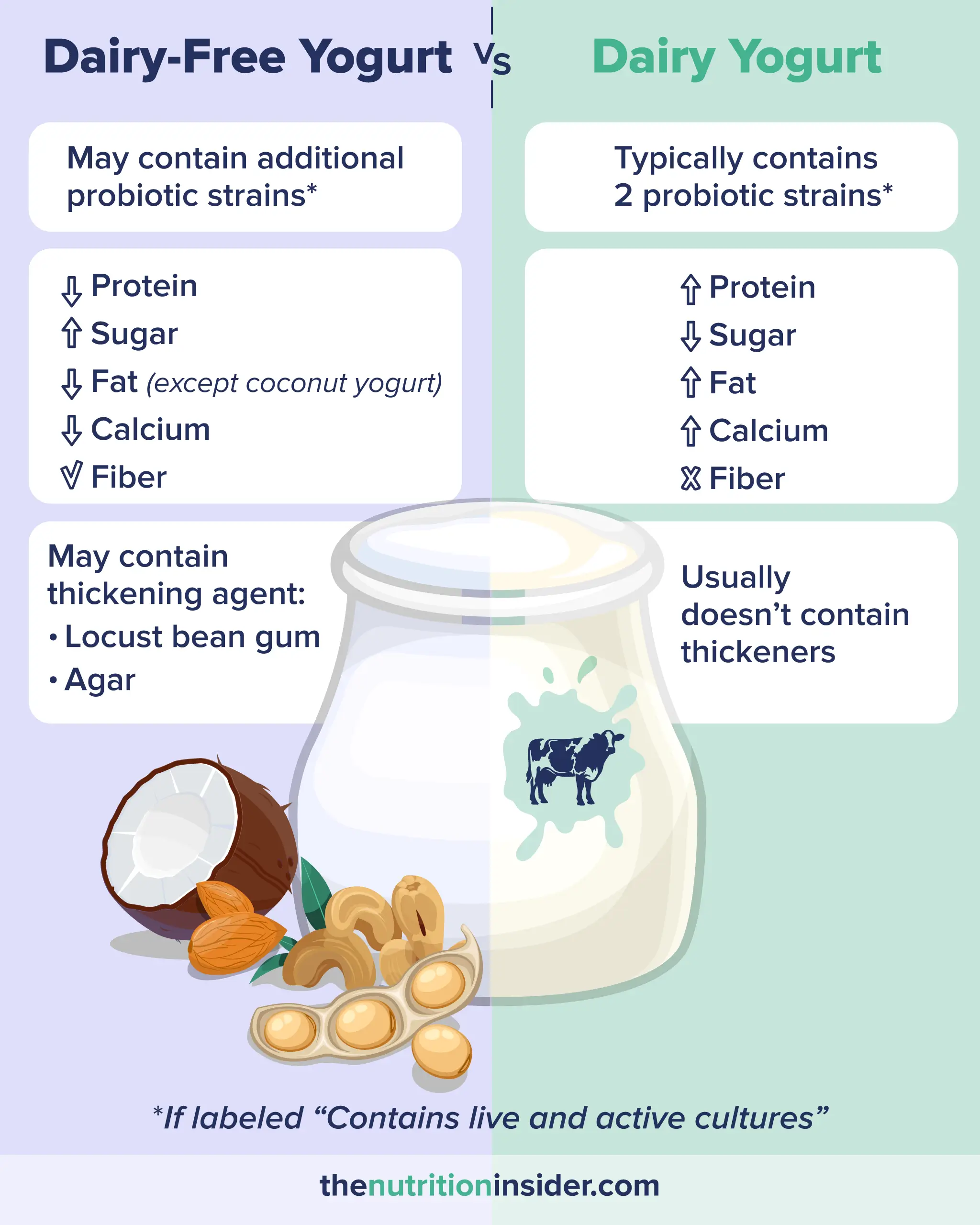Talk to a Registered Dietitian and use INSIDER20 for 20% off!
Talk to a real Dietitian for only $99: Schedule Now
This post contains links through which we may earn a small commission should you make a purchase from a brand. This in no way affects our ability to objectively critique the products and brands we review.
Evidence Based Research To fulfill our commitment to bringing our audience accurate and insightful content, our expert writers and medical reviewers rely on carefully curated research.
Read Our Editorial Policy
Dairy-free yogurt has come a long way since the days when soy was the only option. Now, the shelves are stocked with varieties made from coconut, cashews, oats, almonds, and more, catering to the ever-growing demand for plant-based options.
But whether you are vegan, allergic to dairy, or simply want a different option for your breakfast, you might wonder: does dairy-free yogurt have probiotics and offer the same probiotic benefits as regular yogurt?
For a TL;DR answer: Yes, most dairy-free yogurt contains probiotics—but keep reading to learn more about dairy-free yogurt nutrition, how it’s made, and how it differs from regular yogurt.
Dairy-free yogurt is made almost exactly the same way as regular yogurt—it just has a different starting ingredient (plant-based milk) and may use different bacteria.
It’s made by heating plant-based milk (almond, cashew, coconut, and soy are common options) to 110–115°F and adding live cultures.
Whereas regular yogurt uses two specific types of bacteria, dairy-free yogurt may use Lactobacillus bulgaricus, Streptococcus thermophilus, Lactobacillus acidophilus, or Bifidobacteria.
Like regular yogurt, the live cultures ferment the warm plant-based milk. However, unlike regular yogurt, dairy-free milk does not tend to get very thick during this process. For this reason, vegan yogurts typically have a thickener added, such as agar, tapioca starch, cornstarch, guar gum, xanthan gum, or pectin.
In general, coconut milk and soy yogurt tend to be thicker than almond or other nut-based yogurts (like cashew and almond milk yogurt).
Yes, dairy-free yogurt does have probiotics!
However, it’s important to note that the yogurt must state it has “Live and active cultures” on the label, as some brands may pasteurize the yogurt after the fermentation process, which kills off the healthy bacteria.

Some vegan yogurts may even have more probiotics than regular yogurt, as they could use other bacterial strains (while regular yogurt typically only uses Lactobacillus bulgaricus and Streptococcus thermophilus).
Although certain dairy-free yogurts may have more diverse probiotic strains than regular yogurt, this is not always the case. Some brands stick to just the standard two strains, so it’s best to check the label.
Overall, how many probiotics are present in a dairy-free yogurt will depend on which bacterial strains they use and how long they ferment it, but, in general, it’s true that dairy-free yogurt still contains probiotics.
In general, non-dairy or vegan yogurts tend to be:
However, that is not always the case. Some vegan versions add protein and nutrients and keep the sugar content low.

Let’s compare the nutritional qualities of some of the top vegan yogurt brands on the market compared to Greek yogurt:
| Greek yogurt (Chobani 2%) | Nancy’s Oat Milk Yogurt | Kite Hill Almond Milk Yogurt | Forager Project Cashew Milk Yogurt | |
| Calories | 110 | 120 | 150 | 120 |
| Fat | 3g | 6g | 10g | 9g |
| Sat. Fat | 2g | 3g | 1g | 2g |
| Carbs | 5g | 11g | 12g | 10g |
| Fiber | 0g | 3g | 2g | 1g |
| Protein | 15g | 5g | 4g | 3g |
| Calcium | 180mg | 150mg | 50mg | 14mg |
*All are unsweetened and ~5.3oz
As you can see, the nutritional value of plant-based yogurt can vary widely depending on which vegan milk base is used (and which brand you choose).
Here’s a look at the ingredients found in a popular cashew milk yogurt (Forager Project):
Filtered Water, Organic Cashews, Organic Corn Starch, Organic Coconut Cream, Organic Locust Bean Gum, Agar, Live Active Cultures (S. Thermophilus, L. Plantarum, L. Acidophilus, Bifidus, L. Lactis)
Almost all dairy-free yogurts need a thickening agent (in this case, it uses locust bean gum and agar).
These thickeners are not necessarily unhealthy, but some people with digestive problems may experience symptoms when consumed.
Some non-dairy yogurt brands are lighter on the gums and additives than others.
For example, the brand Cocojune has coconut yogurt with minimal and simple ingredients—here is what you can find in their “Pure Coconut” yogurt:
Organic coconuts, water, organic tapioca, vegan probiotic cultures*
*Bifidobacterium anim. s. lactis BB-12 Lactobacillus acidophilus LA-5 Lactobacillus paracasei CRL 431 Lactobacillus delbrueckii s. bulgaricus Streptococcus thermophilus
A similarly minimal brand is Cocoyo, another coconut yogurt that simply contains organic raw young coconut, organic raw young coconut water, and probiotic cultures (a proprietary blend with 100 billion CFUs per ½ cups).
As far as vegan yogurts go, Cocojune and Cocoyo are the most minimal I’ve seen. Cocojune also has protein-added coconut yogurts, which boost the protein content to 8g per 5 ounces. Even their flavored yogurts are low in added sugar (5 grams per serving)—most flavored yogurts exceed 10-15 grams!
If you have been worried about whether or not you’re getting the gut health benefits when you nix the dairy, fear not—vegan yogurt has just as many (in some cases, possibly more) probiotics as regular yogurt.
The type of non-dairy yogurt to choose is mostly about personal preference—they aren’t too different nutritionally. The only exception is soy yogurt, which has much more protein than nut-based vegan products and is on par with regular yogurt (5-7 grams per serving).
Overall, just like regular yogurt, the healthiest vegan yogurt choices are plain and unsweetened without artificial sweeteners, flavors, or preservatives. You can also look for brands that fortify their yogurt with nutrients such as calcium, vitamin B12, or vitamin D.
Not many yogurt brands (vegan or otherwise) state how many probiotics their yogurt contains—but Cocoyo is one exception. This coconut yogurt states that each ½ cup serving contains 100 billion CFUs of probiotics. However, they use a proprietary blend and do not disclose which bacterial strains they use.
Healthy non-dairy yogurts contain as few ingredients as possible (without artificial preservatives, sweeteners, dyes, or flavors), are unsweetened or have minimal added sugar content, and contain live and active cultures. Soy yogurt tends to have more protein naturally, but some vegan yogurt brands add protein.
Most vegan yogurts are nutritionally subpar to regular yogurt (especially compared to Greek yogurt or skyr), as they do not contain as much protein or calcium. It also tends to be higher in carbohydrates and additives like gums and preservatives. That said, vegan yogurt typically offers a bit of fiber (2-3g per serving), while dairy yogurt does not have any.